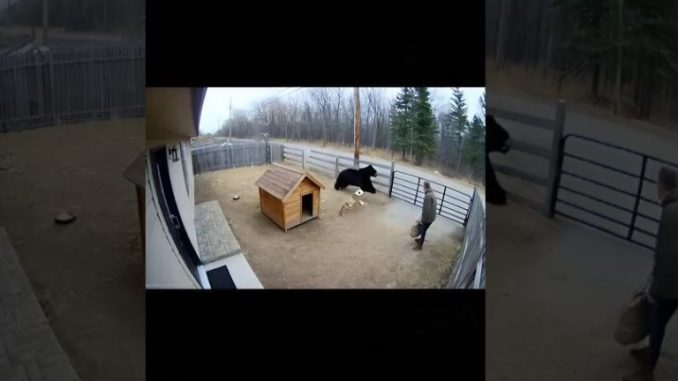
The forest had just finished drinking in a long night of rain. Morning sunlight streamed gently through the tall trees, creating bright lines across the damp trail. Birds began their first songs of the day, and the fresh scent of rain-soaked pine drifted through the air. It was the kind of peaceful moment that makes the forest feel alive again.
Daniel, a seasoned forest ranger, was walking his usual route with quiet steps. His job often brought him into the heart of nature, where every day offered something new. He carried only the essentials: a radio, a small emergency kit, and a tranquilizer dart meant for calming wildlife when needed—not for harm. His morning felt ordinary, almost soothing, until the forest suddenly shifted.
A deep roar echoed through the trees.
Before Daniel could fully register the sound, a large brown bear broke through the underbrush. The animal moved with incredible force, knocking aside branches as it ran. Its fur was damp, and its movements were urgent, almost frantic. Daniel quickly noticed something important: the bear wasn’t simply charging—it was limping. Its leg carried a fresh wound, likely from a trap or sharp object it had struggled against earlier that day.
The bear stopped about twenty feet from Daniel, towering above the ferns and breathing heavily. Despite its size and power, its eyes held more fear than anger. Daniel felt a surge of adrenaline, but he didn’t run. Instead, he slowly lowered himself onto one knee, showing he meant no threat. His heart raced, yet something deeper—a mixture of instinct and compassion—guided him to stay calm.
With deliberate movements, Daniel opened his emergency pouch and pulled out a tranquilizer syringe. It wasn’t a weapon; it was a tool meant to help distressed animals rest long enough for rangers to assist them. He waited, breathing steadily, until the bear shifted its weight and paused. In that brief window, Daniel gently released the tranquilizer.
The bear wavered, then slowly laid itself down onto the soft forest floor. Its breathing steadied as the forest grew quiet once again.
Once the animal was calm, Daniel examined the wound carefully. He cleaned the area and removed what little debris he safely could, offering basic care before stepping back to give the bear space. As night fell, he remained nearby, listening to the forest return to its natural rhythm. Eventually, the bear woke, stood, and disappeared quietly into the trees.
The next morning, all that remained were pawprints in the mud and Daniel’s jacket, which he had placed beside the bear as padding during the night.
Weeks later, Daniel returned to the same spot. The forest was bright, full of sunlight and the sounds of wildlife. At the edge of the clearing, he spotted the bear again—standing tall, calm, and fully healed. For a brief moment, the animal looked directly at him, lifting its head in a peaceful, unhurried gesture before turning and walking back into the trees.
It was a quiet reminder of how understanding and patience can change even the most unexpected of encounters.